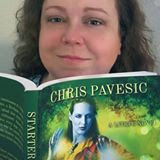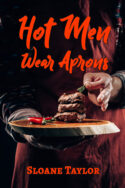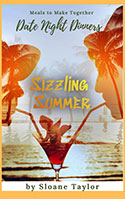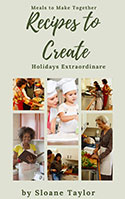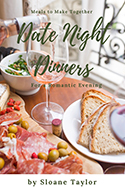When Good Yeast Goes Bad, It’s Time for Dessert!
November 15, 2017 | Author Friend Promo, Cooking
from Chris Pavesic
In baking, the primary function of yeast is to make dough rise. By partially consuming the sugars in the flour the natural metabolism of these microorganisms produces carbon dioxide and ethanol that cause an increase in volume during baking.
Yet yeast can get old. If it is exposed to air or humidity, it may not function correctly. Even a bread machine cannot produce a light, fluffy loaf if the yeast has “gone bad.”
But the loaf is still edible, if somewhat “heavy” or “dense.” It might be a bit misshapen, but it generally tastes good. So what can someone do with a lumpy loaf?
Bread puddings are a great way to transform the unfortunate loaf into a delicious dessert. Add some chocolate and fruit and suddenly the lumpy loaf is the star of the meal!
Note: This can also be prepared with a regular loaf of bread, but it won’t provide as much humor.
BREAD PUDDING
5 large eggs
¾ cup firmly packed brown sugar
3 cups milk
1 tbsp. vanilla extract
1 loaf of bread (about 10 ounces) cut or torn into 1-inch cubes
1½ cups dried fruit (my family loves blueberries or cherries.)
9 oz. bittersweet chocolate chips
Preheat oven to 350° F.
Mix eggs, brown sugar, milk, and vanilla extract in a large bowl. Add handfuls of bread cubes, fruit, and chocolate chips in alternating layers, stirring with each addition.
Now it’s time to get busy. Roll up your sleeves and mix everything together. You want to get some of that flavorful liquid onto every scrap of bread. The mix may seem a little dry. Resist the urge to drown it in more milk or you will end up with a soggy dessert.
Coat a 13 x 9 inch baking dish with butter. Press the mixture into the pan. If you like a dense, heavy bread pudding, keep pressing until there is no air left. If you prefer yours fluffier, just pile it in and spread it around.
Bake uncovered for 45-55 minutes. The top will become a wonderful crunchy brown while the middle stays moist.
Be careful when you remove the pudding from the oven. It’s easy to pick away at the entire dish—whether you are going after a piece of the crusty top, a chewy berry, or a melting chunk of chocolate.
While you indulge in this fantastic dessert, enjoy a brief glimpse into my new novel, Starter Zone.
When hydrologists inscribe the consciousness of a human mind onto a single drop of water, a Revelation sweeps the land. The wealthy race to upload their minds into self-contained virtual realities nicknamed Aquariums. In these containers people achieve every hope, dream, and desire. But governments wage war for control of the technology. Terrorist attacks cause massive destruction. The Aquariums fail. Inscribed human minds leech into the water cycle, wreaking havoc.
Street gangs rule the cities in the three years since the fall of civilization. Sixteen-year-old Cami and her younger sister Alby struggle to survive. Every drop of untreated water puts their lives in peril. Caught and imprisoned by soldiers who plan to sell them into slavery, Cami will do anything to escape and rescue her sister. Even if it means leaving the real word for a life in the realms, a new game-like reality created by the hydrologists for the chosen few.
But life in the realms isn’t as simple as it seems. Magic, combat, gear scores, quests, and dungeons are all puzzles to be solved as the sisters navigate their new surroundings. And they encounter more dangerous enemies than any they faced in the real world.
Time to play the game.
CHAPTER ONE
As the sun hovers near the horizon, ready to dip below and plunge the world into darkness, the weather changes for the worse. Clouds gather. Peeking out my window and over the outline of rooftops in the distance is what looks like thunderheads moving toward me in the invisible polluted gusts of wind.
I try not to think about the coming storm as I methodically pull on my boots and zip up my jacket. It is supposed to be waterproof, but I would not risk going out in anything above a light drizzle. Water has a way of seeping through even the best defenses. There’s also a lining that’s overly warm for a summer evening. I’m already sweating and the discomfort adds to my nerves.
I check the hunting knife strapped to my left leg. It was one of the first weapons purchased for me by my dad back when the sporting goods stores were still open for business. He didn’t think I was ready to handle a handgun at thirteen, but he taught me to shoot a rifle in the open fields by our house, helping me hold the weapon steady until I grew strong enough to support the weight. Now, three years later, I have a handgun, a Ruger semi-automatic, but bullets are scarce and loud noises are problematic. My small ammo stash sits in the bottom of my backpack next to the gun.
Instead of the gun, I carry an extra-light crossbow as my go-to weapon. I can hand-make the bolts so I don’t worry about running out of ammunition and the shot is relatively silent. I carry the spare bolts in a quiver strapped to my right leg. It’s awkward when running, but I can draw the bolts fast when needed.
My little sister, Alby, has loaded her own backpack. I lift it to test the weight and then pull a few things out. I place them in my own pack without comment. I help her position the lighter pack over her shoulders, tightening the straps so that it will stay balanced. She always tries to do more than she should, but I don’t like the way her face has a perpetual pinched, strained look or the deep shadows under her eyes. She looks far older than her seven years. This scares me more than everything else and that fear threatens to register on my face. I force myself to stay calm.
I check her raincoat and boots, making sure everything fits snugly. I help Alby pull up the hood of her coat, tucking in a strand of dark hair that has escaped her ponytail. As frightened as she is, she manages to give me a smile. I smile back, trying to present a brave front. As my dad used to say, “fake it till you make it.” Over the last few years, I’ve been faking confidence more and more often for Alby’s sake.
“Ready to go?” I ask with all the false cheer I can muster in my voice. I take one last glance over the motel room that had served as a temporary home for the last few days, looking for anything that we might have left behind. The room is swept clean. No trace whatsoever that we had ever been there.
Alby nods. “Ready, Cami.”
“If we get separated, remember to keep going north,” I say. “Follow the road till you get to the park, then take the walking paths. No matter what happens, keep going. Stop when you get to the Stone River. I’ll meet you at the bridge in the center of the park where we used to feed the ducks, okay?”
She nods again, looking up at me with those dark eyes so full of trust. I hug her, because if we do get separated, there isn’t much hope we will ever see each other again. I need to keep up the pretense of hope, though, because that’s all we have to keep us going.
Stone River Park is at the very limits of the city and the area surrounding it is relatively unpopulated. I figure that once we are out of the city, our chances of survival will dramatically increase. After reaching the park, we can follow the Stone River north. There’s bound to be deserted houses in the country and less chance that any of the gangs would be interested in the meager pickings outside of the city. We might even be able to find a place to stay before winter.
I crack open the door of our motel room. It is still light enough to stain everything with graying shades of color. The setting sun casts long shadows between the buildings, so I depend more upon my ears to find signs of other humans. I hear no motorcycle engines and no voices, only the wind, blowing and moaning, and the far-off call of a bird. The coming storm appears to have cleared the streets. They are deserted except for empty, crashed vehicles abandoned in every lane.
Alby and I had been lucky to reach the motel a few days ago. The single-story building is on the outskirts of the main town and catered to big rig truck drivers and other traffic from the interstate. I had found the skeleton key in the motel office after climbing in through the bathroom window. Alby and I spent the nights scouring every room for supplies.
No one had broken into it before we got there. Too many other rich targets to go around. But inside each room was a mini-fridge filled with snacks. Even though the electricity had been turned off, the chocolates and small bags of honey-coated nuts were edible. The tiny bottles of alcoholic beverages in each fridge did not seem useful, but I kept a few. They might be helpful in starting a fire someday when we made it outside the city. We even discovered coffee filters and a small bottle of chlorine bleach—a major score for treating our drinking water.
If I hadn’t spent days secretly peering out the dark windows of the motel, I might believe my sister and I were the last two people left on earth. But I know that out there, behind the ruined buildings and boarded-up windows, there are at least a few pairs of eyes whose owners would kill us without a second thought. My eyes flick toward the two bodies hanging from the traffic lights in the nearby intersection. They hadn’t been moved. Good.
The daytime usually belongs to looter-gangs, each with spray-can marked territories in bright displays of color that start on the buildings and drip down toward the pavement. The gangs wear something marked as well, usually a jacket or bandanna that will stand out from a distance. The snipers hole up in their nests and target anyone who encroaches on their gang’s territory. They particularly looked for members of other factions trying to increase their terrain.
Paint tags don’t show up well after dark, though, so the gangs have started leaving their victims as warnings to others not to encroach on their holding. These bodies have been hanging undisturbed in the intersection for several days, indicating a lack of activity in the area. I can only hope that the gangs have moved inward, toward the center of the city and more supply-rich targets.
No one is ever going to catch the murderers, or the ones who strung up the bodies like macabre trophies, and put them in jail. They’ll just go on and do it again and again. Like animals in the jungle—except that animals are not cruel.
We were lucky to go unmolested by the local gangs. Heaven knows we don’t look like we have much of anything, and we don’t look threatening, but that will only last for so long. Someday someone will try to kill us, possibly for no other reason than wanting to watch us die. The whole world, it seems, is at war, and no one is on my side except Alby. We only have each other.
A streak of lightning splits the sky almost directly overhead, making me wince. It is followed by a heavy clap of thunder. As frightening as it is, the bad weather is to our advantage. No one wants to be caught outside in the rain. Everyone is more afraid of fresh, untreated water and what it can do than they are of each other. But I believe we can make it out of the area and to shelter before the rain poses any danger.
In fact, I’m betting our lives on it.
Chris Pavesic is a fantasy author who lives in the Midwestern United States and loves Kona coffee, steampunk, fairy tales, and all types of speculative fiction. Between writing projects, Chris can most often be found reading, gaming, gardening, working on an endless list of DIY household projects, or hanging out with friends.
Learn more about Chris on her website and blog.
Stay connected on Facebook, Twitter, and her Amazon Author Page.




